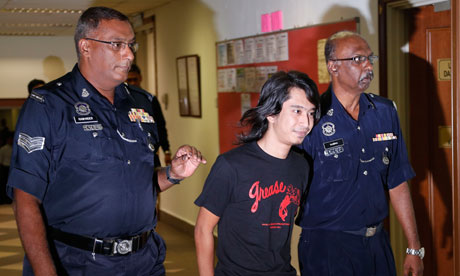The recent crackdown on opposition leaders and pro-democracy activists is a clear sign of the return of ‘Mahathirism’, when high-handed tactics were used to to muzzle dissidents, PKR says.
The slew of arrests yesterday under the Sedition Act are a “return to the days of (former premier Dr) Mahathir (Mohamad)”, when civilians were detained for their “assertion of civil rights”, PKR deputy president Azmin Ali said today.
 “With Home Minister (Ahmad Zahid Hamidi) trying to outdo his predecessors in being high and mighty, and (Prime Minister) Najib (Abdul Razak) remaining in ‘elegant silence’, we certainly can expect more arrests and prosecutions of opposition leaders and civil rights activists,” Azmin (left) said in a statement.
“With Home Minister (Ahmad Zahid Hamidi) trying to outdo his predecessors in being high and mighty, and (Prime Minister) Najib (Abdul Razak) remaining in ‘elegant silence’, we certainly can expect more arrests and prosecutions of opposition leaders and civil rights activists,” Azmin (left) said in a statement.
He urged the people to remain staunch in their pursuit for democracy and to exercise their constitutional rights to voice their objection to the electoral fraud that occurred during the 13th general election.
Yesterday, PKR vice-president Tian Chua, Anything But Umno (ABU) chief Haris Ibrahim and former Batu Berendam MP and PAS member Tamrin Ghafar were arrested for allegedly uttering seditious statements, while student activist Adam Adli Abdul Halim was charged with committing sedition.
Earlier on PKR’s Seri Setia assemblyperson Nik Nazmi Nik Ahmad wascharged with organising an illegal assembly to protest against electoral irregularities.
Several other opposition leaders have also been investigated over various offences, including DAP founding chairperson Dr Chen Man Hin, Serdang MP Ong Kian Ming, Taiping MP Nga Kor Ming and Pandan MP Rafizi Ramli.
‘Home Ministry is high-handed’
DAP also condemned the Home Ministry for its “high-handed approach” in the police crackdown.
Commenting that the arrests so far could be only the “tip of the iceberg”, Segambut MP Lim Lip Eng said DAP leaders were willing to cooperate with the police in their investigations.
“If the police reveal to us the leaders on their list and what the charges are under the relevant laws, we will be more than willing to go to a designated police station at an appointed time,” Lim said.
In another statement, PAS vice-president Mahfuz Omar lashed out at the BN for manipulating the laws and enforcement bodies at their whim in oppressing its political foes.
“The confiscation of Harakah Daily and Suara Keadilan and the arrests of the political activists are proof that they (BN) don’t honour their word to reconcile after their humiliating loss in the election,” Mahfuz said.
 The crackdown also attracted the attention of international human rights watchdog Amnesty International, which called on the government to release all peaceful protesters arrested under the Sedition Act 1948.
The crackdown also attracted the attention of international human rights watchdog Amnesty International, which called on the government to release all peaceful protesters arrested under the Sedition Act 1948.
“Rather than abolishing the repressive sedition law as promised, the government is now using it against peaceful protesters,” Amnesty International’s Asia Pacific’s deputy director Isabelle Arradon said.
Najib, in July last year, vowed to replace the act with a new act to be known as the National Harmony Act.
Amnesty International has repeatedly raised concerns about the Sedition Act and the way the authorities have used it to repress political dissent.
The Sedition Act criminalises a wide array of acts, including those “with a tendency to excite disaffection against any Ruler or government” or to “question any matter” protected by the federal constitution, added Arradon.
 PKR, together with allies PAS and DAP under Pakatan Rakyat, had garnered 51 percent of the popular vote but only secured 40 percent of seats in Parliament as compared to the ruling BN coalition which won 47 percent of the popular vote but bagged 60 percent of seats.
PKR, together with allies PAS and DAP under Pakatan Rakyat, had garnered 51 percent of the popular vote but only secured 40 percent of seats in Parliament as compared to the ruling BN coalition which won 47 percent of the popular vote but bagged 60 percent of seats. However, Wan Azizah today reminded that the electoral verdict showed the “majority” of Malaysians was on Pakatan’s side and Zahid’s assertion showed that BN was insincere about national reconciliation.
However, Wan Azizah today reminded that the electoral verdict showed the “majority” of Malaysians was on Pakatan’s side and Zahid’s assertion showed that BN was insincere about national reconciliation.



















